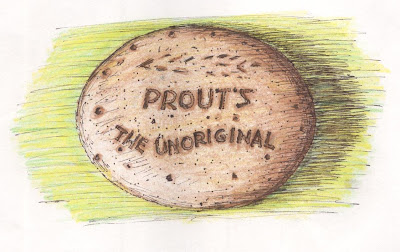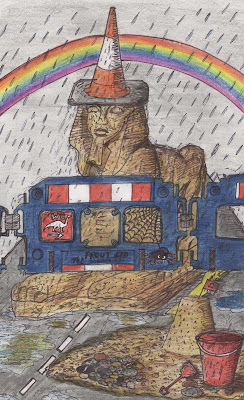Emma-Kate Prout will soon begin her final year as an undergraduate in Earth Science and Geography at Durham University. When she asked if she could write and create some illustrations for the blog she insisted she could do it sensibly if she really tried. Her offer to contribute was welcomed with open arms. No bribes with biscuits were involved.
I was initially unsure where to begin with the blog. My brain was buzzing with half-formed ideas but I didn’t want to simply regurgitate what I’d read about science communication, or copy too closely the good stuff already posted on this page. So I mooched for a while, scribbling any passing words, phrases or thoughts of food on the walls inside my mind. Then I had some biscuits.

After a while longer of me thinking too hard, a thought nudged me in the side of the head: I realised that when I write, or indeed do many other things, I’m half-aware of all sorts of scientific processes- both physical and mental- in operation. And not only do I write about science, and read others’ writing about science, but the whole process of writing, from head (and heart?) to pen and paper, seems to be as much a science as an art- or at least the outcome of a whole splurge of scientific activity. Once you make the links, isn’t everything inseparable from some aspect or another of science, whether or not we understand it yet? It occurred to me that even a few years ago, I didn’t generally think so ‘scientifically’ whilst engaged in writing or anything else except Science as a School Subject. Writing was writing. Science was science. And I decided that ‘proper’ science writing wasn’t proper writing; yes, it was necessary, but a necessary, white-coated vacuum for lyricism and wit. Something changed at some point since then. I decided that the enlightenment I seemed to have undergone was something to celebrate and so began some more blog-shaped ramblings…
Consciousness of science in everyday life, even just of its presence and importance if not its details, opens the mind to a whole new way of thinking (to be blogged about later). The ‘Whys’ are a quality (not a disease) in young children, even if they don’t see them as ‘science’, but are unfortunately often lost later. My early childhood was a whirl of curiosity. There was no specialisation, no segregation of subjects: it was just life and learning. A lot of time was spent in nature, with a semi-permanent coating of water, sand and/or mud, and an innate scruffiness that seems to have survived the years since. Most of the rest of the time, I was attached to a pen, paintbrush, book or musical instrument, and swapped the dirtiness for more refined paint, glue and glitter.
Collecting pebbles was always an addiction. I loved the ink-splashes of colour when I wet them, the stripy, sparkly or speckled ones and the small, round ones that looked like toffe
 e. No sooner was one stone stuffed into a fast-wearing-out pocket than another appeared in a tantalising new shade or an even-more perfect heart shape than before. I was also the proud owner of a delightful, orange-flecked lump of alleged dinosaur poo (‘Jurassic Krap’, I announced to anyone and everyone: ‘Don’t blame me; it’s printed on the poo’). I travelled my world in all weathers, in my own mobile library: my coat carried the legends of Earth in a myriad of minerals. The stones are still scattered among vast collections of childhood paintings, poetry, sketches and stories- volumes on a world with everything from road works to rainbows and spiders to sphinxes.
e. No sooner was one stone stuffed into a fast-wearing-out pocket than another appeared in a tantalising new shade or an even-more perfect heart shape than before. I was also the proud owner of a delightful, orange-flecked lump of alleged dinosaur poo (‘Jurassic Krap’, I announced to anyone and everyone: ‘Don’t blame me; it’s printed on the poo’). I travelled my world in all weathers, in my own mobile library: my coat carried the legends of Earth in a myriad of minerals. The stones are still scattered among vast collections of childhood paintings, poetry, sketches and stories- volumes on a world with everything from road works to rainbows and spiders to sphinxes.
Gradually, I developed more of a mental distinction between subjects. I don’t remember ever actively disliking science, despite what I said at the time. I went through school quietly, an eco-geek interested in most things except computers, cosmetics and conformity, yet seemingly lacking my now-unconcealed scienciness. Until relatively recently, science was simply ok. I studied it and worked hard, but I certainly wasn’t a ‘scientist’ and never would be, so I said. I think it was a mentality maintained by habit and fear rather than lack of interest. Science had become, in my mind, synonymous with ‘not creative’ and had to be put into mental solitary confinement so as not to eat away at the bigger, juicier right side of my brain: I didn’t want to lose my way with words or skills with a sketchbook among too much logic and lab work.
For a while, then, I didn’t see the planet that I’d hitched a ride on as a spinning ball of science. But something clicked since then. It wasn’t in a single moment; more a series of Rubix cube clicks that led to logic making chaos less…chaotic, yet no less colourful. Constantly, though, the little science-squares mix and multiply with more discoveries. There will always be grey blocks of the unknown: just as we scribble in one with a new theory, we notice another shaded in. In Life and Learning, Part 2: Outside Box Town I will share with you a small journey of scientific revelation...
This was absolutely delightful and I loved the illustrations! More please. Looking forward to Part 2.
ReplyDeleteThanks, Linda! I think the Sphinx is taking the biscuit though... Part 2 to come in the next day or two. Your posts made me smile.
ReplyDeleteThe anonymous Emma-Kate
I found myself smiling too
ReplyDelete